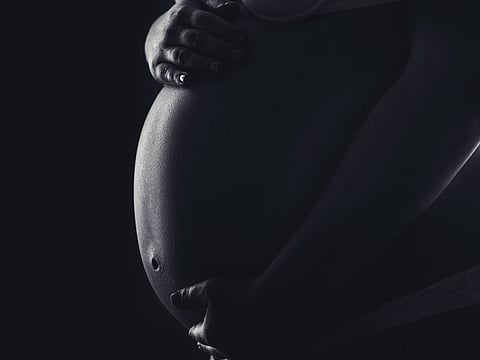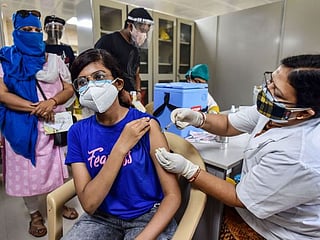No damage to placenta in pregnancy from COVID-19 vaccines: Study
Research results add to growing evidence that COVID-19 vaccines are safe during pregnancy

Highlights
- Study on 200 pregnant women show COVID vaccine using mRNA platform does not damage the placenta.
- Results were "preliminary" and published one May 11, 2021 in the journal Obstetrics & Gynecology.
- it's the first such study to examine the impact of the COVID vaccines on the placenta.
- The placenta is the first organ that forms during pregnancy.
- It performs duties for most of the foetus’ organs while they’re still forming in the womb — such as providing oxygen while the lungs develop and nutrition while the foetal gut is forming.
Women who received COVID-19 vaccines during pregnancy yielded no damage to the placenta, a new study shows. The Northwestern Medicine research, published in the journal Obstetrics & Gynecology, looked into the placentas from patients who received the COVID-19 vaccine during pregnancy and found "no evidence of injury".
The study is significant: it add to the growing evidence that COVID-19 vaccines, at least the ones that use the mRNA platform, are safe in pregnancy.
The study’s corresponding author Dr. Jeffery Goldstein, assistant professor of pathology at Northwestern University Feinberg School of Medicine, explained: “The placenta is like the ‘black box’ in an airplane. If something goes wrong with a pregnancy, we usually see changes in the placenta that can help us figure out what happened.”
“From what we can tell, the COVID vaccine does not damage the placenta,” added Dr. Goldstein. In the peer-reviewed study, published on Tuesday (May 11, 2021) in the journal Obstetrics & Gynecology, authors said it is the first investitation into impact of the COVID vaccines on the placenta. The team said the results of their research, done on 200 pregnant women, were "preliminary", and recommended a bigger size of volunteers to confirm initial findings.
How does the study help address vaccine hesitancy?
“We have reached a stage in vaccine distribution where we are seeing vaccine hesitancy, and this hesitancy is pronounced for pregnant people,” said study co-author Dr. Emily Miller, Northwestern Medicine maternal fetal medicine physician and assistant professor of obstetrics and gynecology at Feinberg. “Our team hopes these data, albeit preliminary, can reduce concerns about the risk of the vaccine to the pregnancy.”
How many pregnant women were involved in the research?
200. The Northwestern Medicine study authors, led by Dr Elisheva Shanes, collected placentas from 84 vaccinated patients and 116 unvaccinated patients who delivered at Prentice Women’s Hospital in Chicago. Then they examined the placentas whole and microscopically following birth.
What vaccines did the patients get, and when?
Most patients received vaccines — either Moderna or Pfizer — during their third trimester (weeks 28 through 42 of pregnancy).
Also Read: H1N1 vaccine available for pregnant women
What are the results of the placenta-after-vaccination study?
Antibody: What is it?
An antibody (Ab), also known as an immunoglobulin (Ig),[1] is a large, Y-shaped protein used by the immune system to identify and neutralise foreign objects such as pathogenic bacteria and viruses. The antibody recognises a unique molecule of the pathogen (aka an "antigen", any molecule that triggers an immune response).
What do previous studies show?
One study, published in the journal NEJM on April 21, 2021, had 35,961 participants (all pregnant women ages 16 to 54 years). Initial results found no reports of neonatal death.
That study, led by Dr Tom T. Shimabukuro, entitled "Preliminary Findings of mRNA Covid-19 Vaccine Safety in Pregnant Persons", was conducted from December 14, 2020, to February 28, 2021. It used data from the “v-safe after vaccination health checker” surveillance system (v-safe pregnancy registry), and the Vaccine Adverse Event Reporting System (VAERS) to characterise the initial safety of mRNA Covid-19 vaccines in pregnant women.
What were the results of NEJM study on results of vaccinating pregnant women?
What's the significance of the vaccinated women's placenta study?
It came out a year after a similar study on the placenta of pregnant women who had COVID. In May 2020, Goldstein, Miller and fellow researchers from Northwestern Medicine and Chicago's Ann & Robert H. Lurie Children’s Hospital published a significant study which found placentas of women who tested positive for the COVID-19 virus while pregnant showed "evidence of injury" (abnormal blood flow between mother and baby in utero).
Should pregnant women now feel safe getting vaccinated?
The Northwestern Medicine research on placenta of vaccinated women, though "preliminary," shows evidence that pregnant patients who want to get vaccinated to avoid contracting the disease should feel safe doing so. Scientists also found that pregnant women make COVID antibodies after vaccination and successfully transfer them to their foetuses.
The Dr Shimabukuro-led review concluded: "Preliminary findings did not show obvious safety signals among pregnant persons who received mRNA Covid-19 vaccines." His team, however, recommende a more longitudinal follow-up, including follow-up of large numbers of women vaccinated earlier in pregnancy, which they deemed necessary to inform maternal, pregnancy, and infant outcomes.
Moreover, researchers pointed out that the study on the safety of mRNA Covid-19 vaccines during pregnancy and the periconception period indicates that some pregnant persons in the United States are choosing to be vaccinated against COVID-19 in all trimesters of pregnancy.
Miller said: "We are beginning to move to a framework of protecting foetuses through vaccination, rather than from vaccination,” Miller said. "Until infants can get vaccinated, the only way for them to get COVID antibodies is from their mother,” Goldstein said.
What is the placenta’s role in the immune system?
The placenta is the first organ that forms during pregnancy. It performs duties for most of the foetus’ organs while they’re still forming. The placenta provides oxygen while the lungs develop and nutrition while the gut is forming. Additionally, the placenta manages hormones and the immune system, and tells the mother’s body to welcome and nurture the foetus rather than reject it as a foreign intruder.
“The Internet has amplified a concern that the vaccine might trigger an immunological response that causes the mother to reject the foetus,” Goldstein said. “But these findings lead us to believe that doesn’t happen."
The scientists also looked for abnormal blood flow between the mother and foetus as well as problems with foetal blood flow. These events reported in pregnant patients who were PCR-test confirmed positive for COVID-19.








